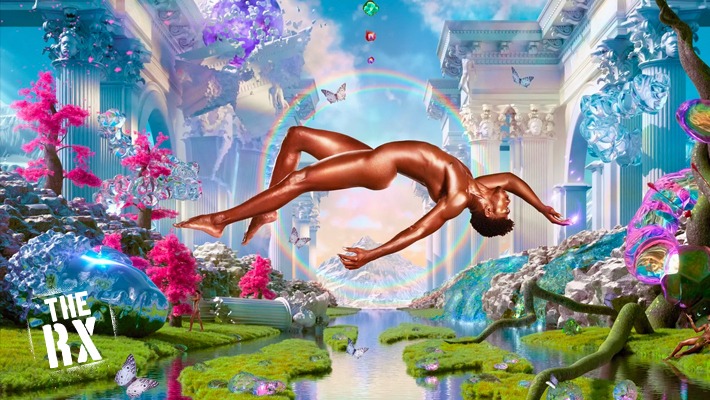The RX is Uproxx Music’s stamp of approval for the best albums, songs, and music stories throughout the year. Inclusion in this category is the highest distinction we can bestow and signals the most important music being released throughout the year. The RX is the music you need, right now.
In the lead-up to the release of his debut album, Montero, Lil Nas X was confronted with a question. The question’s method of delivery and its questionable messenger failed to undermine its import — although it also likely highlighted a different problem than the inquirer intended. Pointing out the Montero tracklist’s lack of Black male artists, our concern trolling, gay panic conspiracy theorist wanted to draw attention to the project’s so-called “agenda.” Instead, they only threw Nas’ historical position within hip-hop into stark contrast.
Hip-hop has always had a homophobia problem. From its very inception, the genre has touted an image of Black masculinity that left little room for alternative expressions of manhood. Words like “gay,” “homo,” “f****,” and more have been slung indiscriminately for decades in the music of giants like 50 Cent, Big L, Diplomats, Eminem, Jadakiss, Jay-Z, Lil Wayne, Meek Mill, Nas, and Tyler The Creator. Even so-called conscious rappers and seemingly progressive allies, including Chance The Rapper, J. Cole, and Nicki Minaj have peppered their ostensibly innocuous bars with language that undermines their positive messages.
It’s even more astonishing that Tyler The Creator eventually came out as queer on his 2017 game-changer Flower Boy. It cast his prior offenses in a new light, while also muddling the impact of his admission. Why, if Tyler was gay or bi, would he spend so much of his early career flinging this specific species of invective? It was never haphazard either — the intentionality of his jabs was seen in the unapologetic way he handled the question in interviews, even before coming out. Was this the only way he felt he could establish his credibility in a genre that so often rejects queer people, let alone artists seeking their fortunes within it?
And is this why Lil Nas X, whose first attempt to breakthrough in the industry was the rap-focused Nasarati mixtape, built himself as more of a pop star now? Never mind how he defines himself, though, because the backlash he’s drawn has come much more from rap mainstays like Dave East, Joyner Lucas, and Lil Boosie than it has from pop circles. His music, though it’s pop-influenced, is grounded in hip-hop’s production, vocal delivery, and flair for braggadocio, even as he takes tremendous steps away from pure rapping on Montero.
This is where the crooning, grungy closer “Am I Dreaming” lives. As Nas duets with Miley Cyrus, he implores the listener to take his stories and experiences with them. It’s the most outward-facing song here, the one time the album truly acknowledges what Nas is doing for the rest of the album: Creating a space for artists like himself to flourish in a hostile environment, simply by being too talented to ignore. If no other Black male artists will work with him, he won’t just make do, he’ll jump the entire pop music hierarchy, tapping mega stars like Miley and icons like Elton John (who appears on the sobering “One Of Me,” on which Nas addresses the pressure to fit in and serve the whims of a fickle audience) to validate himself instead.
Elsewhere, Nas nods to the wave of female talent currently tipping hip-hop’s scales away from its hypermasculine origins, employing Doja Cat and Megan Thee Stallion, two of his fellow No.1 record-holders from 2020, to replace artists who couldn’t or wouldn’t show up. If rap fans are so miffed about Jack Harlow’s placement on “Industry Baby,” then that ire should be directed at all the other rappers who could and should have jumped at the chance to rock along with Nas on what would assuredly be a massive hit. Of course, if those fans kept open minds, they would hear razor-sharp verses from the atypical trio of rap guests — especially from Doja, who delivers a witty missive on “Scoop.”
But the star remains Lil Nas X and his unique perspective — at least within hip-hop. Perhaps the most telling aspect of his stature is the fact that songs like “Call Me By Your Name” and “Sun Goes Down” have resonated so deeply within the audience, despite departing so sharply from the usual content and texture expected of rappers in the modern era. Even when he treads familiar territory such as depression on “Tales Of Dominica” and “Don’t Want It” and alienation on “Life After Salem,” his most relatable material is informed by two things: 1. The fact he is a gay Black man, and 2. His clearly defined pop sensibilities.
Old school hip-hoppers have always rejected rap’s categorization as pop… but sometimes I wonder why. Is it because pop is seen foremost as the domain of women, especially young white women? Is it because relating too closely to those sounds and sentiments can be seen as feminine, and therefore as gay? I can certainly see why that would feel like a threat, even boys are taught games like “Smear The Queer” before they are even old enough to know what “queer” means (see: Moonlight). Being different means being a target… but it also means standing in the spotlight. It means being seen for better or worse. By embracing pop and hip-hop and all the parts of himself he’s always been told not to, Lil Nas X sets an example. He makes space for the next generation. He moves the balance ever so slightly toward acceptance.
Montero is out now via Columbia Records. Get it here.
Some of the artists mentioned here are Warner Music artists. Uproxx is an independent subsidiary of Warner Music Group.

